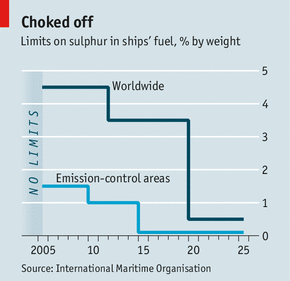|
The Economist on Sinking Under a Big Green Wave
 "Ships used to burn the cheap, unrefined crud, laden with sulphur and other nasties, that is left over when oil is refined. The fine soot that such fuel gives off can cause premature deaths from asthma and heart attacks. So in 2005 the IMO started to limit the sulphur content of maritime fuel, especially in “emission-control areas” along heavily populated coasts in North America and Europe. These limits are set to be tightened drastically (see chart). Ships will have to start burning better grades of fuel, similar to diesel. "Ships used to burn the cheap, unrefined crud, laden with sulphur and other nasties, that is left over when oil is refined. The fine soot that such fuel gives off can cause premature deaths from asthma and heart attacks. So in 2005 the IMO started to limit the sulphur content of maritime fuel, especially in “emission-control areas” along heavily populated coasts in North America and Europe. These limits are set to be tightened drastically (see chart). Ships will have to start burning better grades of fuel, similar to diesel.
Such fuels currently cost about 50% more than unrefined “residual” grades, and their prices will surely rise as ship operators scrap with car owners and airlines for the limited amounts that refineries can turn out. The ICS is pleading with the IMO to conduct a study of whether there will be enough of the fuel to go around.
Shipping firms are also under pressure to cut their emissions of carbon dioxide and other greenhouse gases. The IMO reckons that ships cause about 2.7% of total man-made emissions, a bit more than planes but a lot less than cars and trucks. Under a convention it has brought into force this year, ships will have to introduce fuel-economy measures with the aim of reducing their emissions by 20% by 2020 and 50% by 2050."
Back to Re-Refineries
|
|








 "Ships used to burn the cheap, unrefined crud, laden with sulphur and other nasties, that is left over when oil is refined. The fine soot that such fuel gives off can cause premature deaths from asthma and heart attacks. So in 2005 the IMO started to limit the sulphur content of maritime fuel, especially in “emission-control areas” along heavily populated coasts in North America and Europe. These limits are set to be tightened drastically (see chart). Ships will have to start burning better grades of fuel, similar to diesel.
"Ships used to burn the cheap, unrefined crud, laden with sulphur and other nasties, that is left over when oil is refined. The fine soot that such fuel gives off can cause premature deaths from asthma and heart attacks. So in 2005 the IMO started to limit the sulphur content of maritime fuel, especially in “emission-control areas” along heavily populated coasts in North America and Europe. These limits are set to be tightened drastically (see chart). Ships will have to start burning better grades of fuel, similar to diesel.